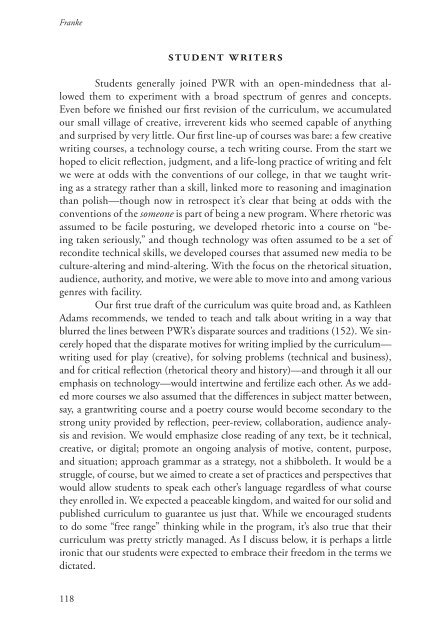Design Discourse - Composing and Revising Programs in Professional and Technical Writing, 2010a
Design Discourse - Composing and Revising Programs in Professional and Technical Writing, 2010a
Design Discourse - Composing and Revising Programs in Professional and Technical Writing, 2010a
Create successful ePaper yourself
Turn your PDF publications into a flip-book with our unique Google optimized e-Paper software.
Franke<br />
student writers<br />
Students generally jo<strong>in</strong>ed PWR with an open-m<strong>in</strong>dedness that allowed<br />
them to experiment with a broad spectrum of genres <strong>and</strong> concepts.<br />
Even before we f<strong>in</strong>ished our first revision of the curriculum, we accumulated<br />
our small village of creative, irreverent kids who seemed capable of anyth<strong>in</strong>g<br />
<strong>and</strong> surprised by very little. Our first l<strong>in</strong>e-up of courses was bare: a few creative<br />
writ<strong>in</strong>g courses, a technology course, a tech writ<strong>in</strong>g course. From the start we<br />
hoped to elicit reflection, judgment, <strong>and</strong> a life-long practice of writ<strong>in</strong>g <strong>and</strong> felt<br />
we were at odds with the conventions of our college, <strong>in</strong> that we taught writ<strong>in</strong>g<br />
as a strategy rather than a skill, l<strong>in</strong>ked more to reason<strong>in</strong>g <strong>and</strong> imag<strong>in</strong>ation<br />
than polish—though now <strong>in</strong> retrospect it’s clear that be<strong>in</strong>g at odds with the<br />
conventions of the someone is part of be<strong>in</strong>g a new program. Where rhetoric was<br />
assumed to be facile postur<strong>in</strong>g, we developed rhetoric <strong>in</strong>to a course on “be<strong>in</strong>g<br />
taken seriously,” <strong>and</strong> though technology was often assumed to be a set of<br />
recondite technical skills, we developed courses that assumed new media to be<br />
culture-alter<strong>in</strong>g <strong>and</strong> m<strong>in</strong>d-alter<strong>in</strong>g. With the focus on the rhetorical situation,<br />
audience, authority, <strong>and</strong> motive, we were able to move <strong>in</strong>to <strong>and</strong> among various<br />
genres with facility.<br />
Our first true draft of the curriculum was quite broad <strong>and</strong>, as Kathleen<br />
Adams recommends, we tended to teach <strong>and</strong> talk about writ<strong>in</strong>g <strong>in</strong> a way that<br />
blurred the l<strong>in</strong>es between PWR’s disparate sources <strong>and</strong> traditions (152). We s<strong>in</strong>cerely<br />
hoped that the disparate motives for writ<strong>in</strong>g implied by the curriculum—<br />
writ<strong>in</strong>g used for play (creative), for solv<strong>in</strong>g problems (technical <strong>and</strong> bus<strong>in</strong>ess),<br />
<strong>and</strong> for critical reflection (rhetorical theory <strong>and</strong> history)—<strong>and</strong> through it all our<br />
emphasis on technology—would <strong>in</strong>tertw<strong>in</strong>e <strong>and</strong> fertilize each other. As we added<br />
more courses we also assumed that the differences <strong>in</strong> subject matter between,<br />
say, a grantwrit<strong>in</strong>g course <strong>and</strong> a poetry course would become secondary to the<br />
strong unity provided by reflection, peer-review, collaboration, audience analysis<br />
<strong>and</strong> revision. We would emphasize close read<strong>in</strong>g of any text, be it technical,<br />
creative, or digital; promote an ongo<strong>in</strong>g analysis of motive, content, purpose,<br />
<strong>and</strong> situation; approach grammar as a strategy, not a shibboleth. It would be a<br />
struggle, of course, but we aimed to create a set of practices <strong>and</strong> perspectives that<br />
would allow students to speak each other’s language regardless of what course<br />
they enrolled <strong>in</strong>. We expected a peaceable k<strong>in</strong>gdom, <strong>and</strong> waited for our solid <strong>and</strong><br />
published curriculum to guarantee us just that. While we encouraged students<br />
to do some “free range” th<strong>in</strong>k<strong>in</strong>g while <strong>in</strong> the program, it’s also true that their<br />
curriculum was pretty strictly managed. As I discuss below, it is perhaps a little<br />
ironic that our students were expected to embrace their freedom <strong>in</strong> the terms we<br />
dictated.<br />
118


















